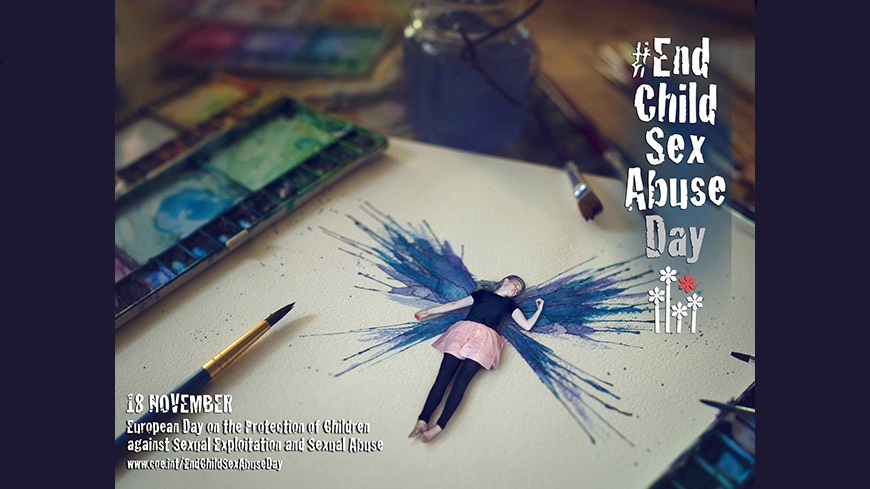Since 2015, we celebrate 18 November as the European Day on the Protection of Children against Sexual Exploitation and Sexual Abuse.
Unfortunately, these phenomena still exist in our societies as tragic realities and represent serious violations of children’s rights, with long lasting and often detrimental effects on children’s lives.
Sexual exploitation and sexual abuse of children can happen at home, in school, during extra curricula activities, on the streets, over the phone, through a webcam or online in general. In most cases (70 to 85%) it is inflicted by someone the child knows, in their circle of trust, and causes lifelong damage to the child’s physical and mental health. In 90% of the cases, the sexual violence acts are not reported to the police.
The European Day for the Protection of Children Against Sexual Exploitation and Sexual Abuse objectives are to:
- raise public awareness on sexual exploitation and sexual abuse of children, and the need to prevent such acts;
- facilitate open discussion on the protection of children against sexual exploitation and sexual abuse and help prevent and eliminate the stigmatisation of victims;
- promote the ratification and implementation of the Lanzarote Convention - a unique legally binding instrument that obliges Parties to criminalise all forms of sexual violence against children and spells out the ways to fight it.
Council of Europe member States and civil society have ownership for marking and organising the European Day for children and for everyone who interacts with them in their personal or professional capacity (parents, teachers, law enforcement agents, sport coaches, non-governmental organisations, etc.). They can hold national actions and decide themselves on the initiatives they wish to take, particularly through the use of social media and already existing networks. Any action is possible, such as lectures at schools, discussions, screening of films on the topic of sexual violence against children, public statements and media events.
Each year, the Council of Europe invites its partners to focus on a specific topic on the occasion of the European Day.
The 2020 edition of the European Day focuses on “Preventing risky behaviour by children: child self-generated sexual images and/or videos”. The Council of Europe partners with a wide audience to celebrate the European Day including member states, civil society organisations and national parliaments. Children are increasingly exploring and expressing their sexuality through information and communication technologies (ICTs), in particular social media and messaging applications. This includes generating and sharing sexually suggestive or explicit images and/or videos of themselves. However, they often underestimate the risks associated with this behaviour, are under peer pressure to share such images and/or videos, or are tempted to engage in risky behaviour. It is essential to develop comprehensive prevention programmes to avoid such behaviour, as such images and/or videos may end up on the internet and may result in children being targeted for sexual coercion and/or extortion.
Who is the European Day for?
■This day is meant for children and for everyone who interacts with children in their personal or professional capacity:
► parents;
► local, regional and national authorities;
► professionals working with children, including educators, sport coaches, law enforcement agents, etc.;
► non-governmental organisations;
► the private sector.
Information and materials in Ukrainian for awareness campaigns can be found here.





